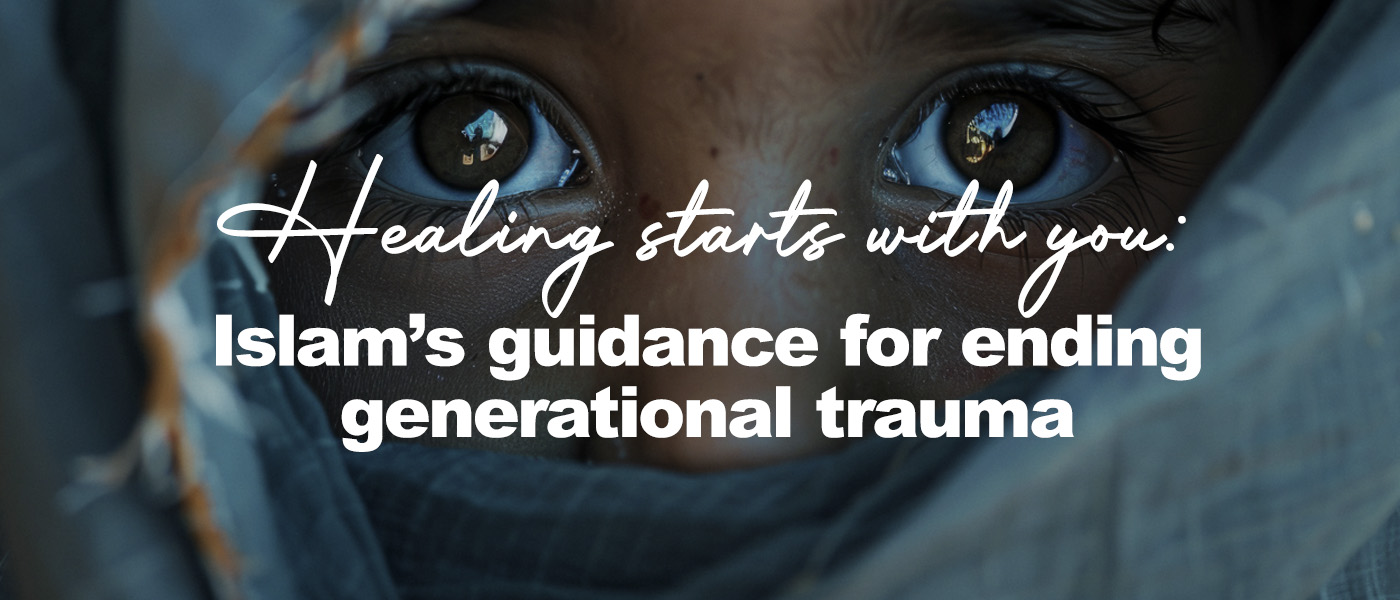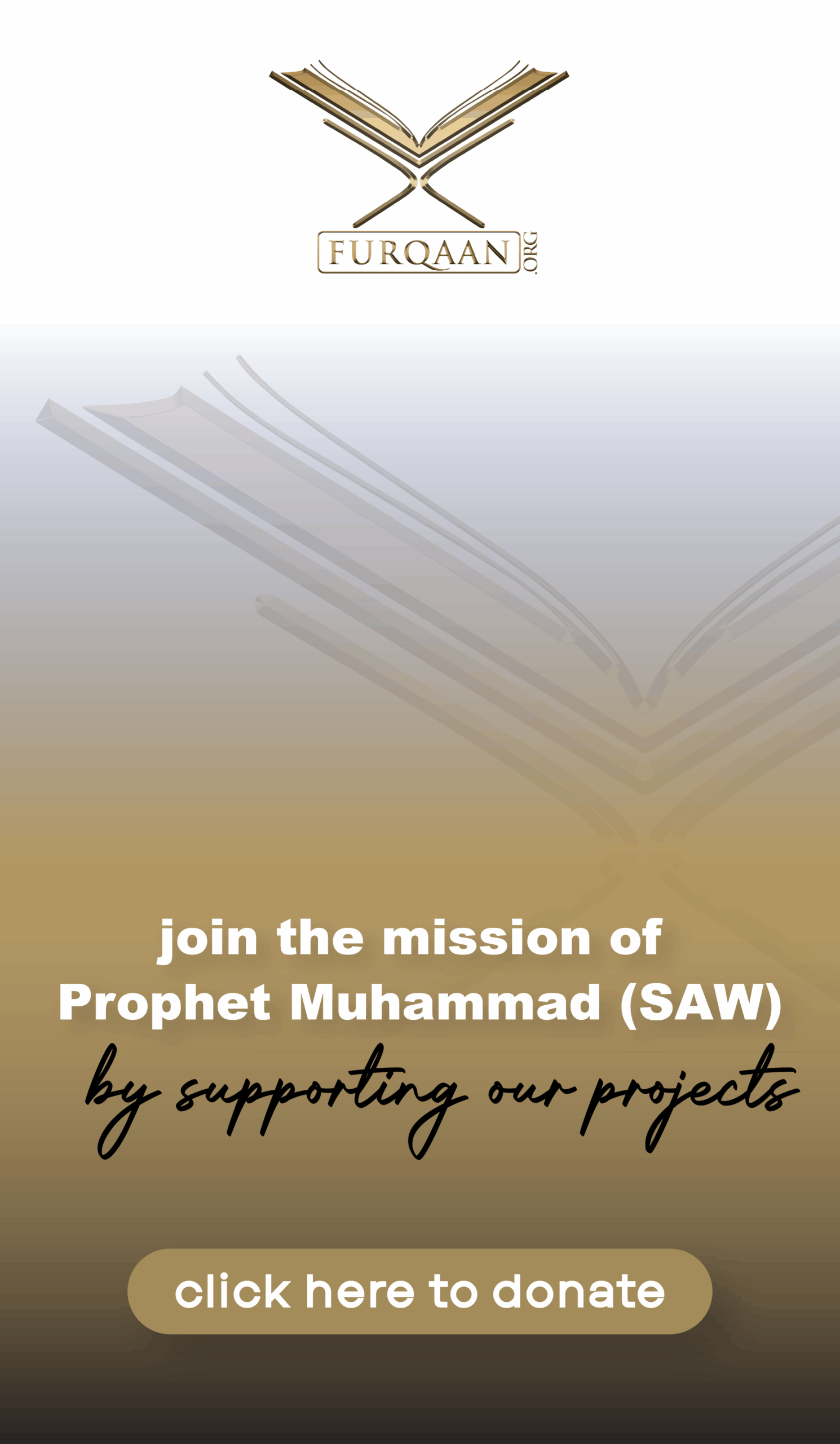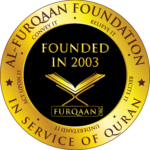
Have you ever met someone in life who appears to be so cheerful, put together, strong, and influential that they almost seem untouchable to you? Then, when you finally get to know them and they reveal their vulnerabilities to you, it leaves you in a state of shock, anger, denial, and sometimes even pity because of the scars and unfathomable weight they’ve had to carry upon their shoulders? Perhaps in your life, you may have very well been this person. Within a person, there are some wounds that are outwardly visible and ones that are not only hidden within themselves, but some that run extremely deep because they are inherited from a previous generation. These are experiences that completely break an individual, and they are experiences that live quietly inside of a lineage that shapes temperaments, fears, anxieties, and expectations long after a particular moment has passed. The Quran and Sunnah have shed light on the detrimental impacts of generational trauma long before psychology and modern medicine ever even recognized it.
The Quran’s revelation has recognized that pain can echo through families, influence moral decisions, and distort the way human beings relate to one another. It has also offered a path for how those echoes can be interrupted, transformed into something more positive, or finally laid to rest with the birth of a new generation. The Quran recognizes that a human being is a beautiful web of stories (stories of their parents, the burdens they’ve carried, the mistakes a child has inherited from them, and the spiritual legacies they are a part of). It acknowledges that families can pass down mercy, knowledge, and righteousness and, simultaneously, fear, dysfunction, fractured emotional language, and cycles of sin.
What makes The Quran so remarkable is that it neither romanticizes nor avoids the complexity of family wounds, but it instead insists that faith has the power to break patterns that entire bloodlines assumed would be permanent. Within this article, we will explore certain powerful stories from The Quran that highlight how generational trauma has existed since the advent of mankind and, ultimately, what our beloved Prophet Muhammad (SAW) teaches us about how to eradicate such traumas and live a life that is truly healthy, happy, and meaningful.
The very first wound in mankind: How the story of Prophet Adam (as) and Iblis set the framework of trauma
The Quran introduces the earliest human story with an emphasis on how the consequences of a major event can reshape the emotional and spiritual reality for the generations that follow. When Prophet Adam (as) and Lady Hawwa were sent down to the earth, Allah (SWT) addressed both them and their descendants when He (SWT) said in The Quran, “We said, ‘Descend all of you! Then when guidance comes to you from Me, whoever follows it, there will be no fear for them, nor will they grieve.’” (The Clear Quran®, 2:38)

This verse is not a casual statement, it signals a turning point in human experience. Before this moment, Prophet Adam (as) and Lady Hawwa lived in a world free of fear, insecurity, danger, or uncertainty. Their descent into the earthly realm introduced a new set of emotional realities, struggle, vulnerability, and exposure to hardship.
By addressing “all of you,” The Quran frames this shift as something that will shape the human condition across generations. In other words, the first major event in human history sets the tone for the psychological and spiritual challenges that every generation thereafter will encounter. This becomes even clearer in the story of Prophet Adam’s (as) sons, Habil and Qabil, where The Quran presents the first example of how unaddressed inner turmoil in one generation can erupt into patterns that deeply affect the next. The Quran describes Qabil’s internal struggle with jealousy and resentment, noting, “Still, the other convinced himself to kill his own brother, so he killed him—becoming a loser.” (The Clear Quran®, 5:30)

This verse highlights an inner prompting, an unchecked emotional state that escalated into the first murder in human history. This act did not remain an isolated tragedy, its consequences echoed throughout humanity’s moral consciousness. The Prophet (SAW) captured this in a profound hadith when he said, “No soul is killed unjustly except that a share of the burden falls upon the first son of Adam, for he was the first to introduce murder.” (Sahih Bukhari)

This narration is not about the inherited guilt but about inherited impact—a destructive pattern introduced by one individual becomes a recurring feature of human suffering. In modern terms, this is an early expression of generational trauma. The idea that certain actions, when introduced, create a precedent, a memory, and a pattern that other generations continue to live with.
Prophet Ya’qub (as) and multi-layered family pain
Among all the families mentioned within The Quran, perhaps none captures the weight of generational trauma as vividly as the family of Prophet Ya’qub (as). The pain begins with his own relationship with his brother Esau (or in Islamic tradition he is known as al-’Is) where tension, rivalry, and fear marked his early life. That early difficulty precedes the more famous cycle (his sons’ betrayal of Prophet Yusuf (as), their deception, and the years of grief that reshaped Prophet Ya’qub’s (as) emotional world). When Prophet Ya’qub (as) said, “He replied, ‘I complain of my anguish and sorrow only to Allah, and I know from Allah what you do not know.’” (The Clear Quran®, 12:86)

, it is not the cry of man experiencing a single isolated tragedy, it is the cry of a man who has lived through a lifetime of relational wounds. His tears do not only reflect Prophet Yusuf’s (as) loss but every unresolved tension, relational fracture, and paternal fear that became intertwined with that loss.
The Quran allows readers to witness how trauma can stretch over decades and how unresolved pain can influence the behavior of an entire generation. The way Prophet Ya’qub’s (as) older sons deal with Prophet Yusuf (as) through jealousy, insecurity, and impulsive cruelty, reflects how emotional wounds and spiritual diseases can replicate themselves when unhealed. And yet, the same story offers the clearest divine message: generational cycles are not destiny. Prophet Yusuf (as), who suffers abandonment, slavery, exile, and imprisonment, refuses to allow bitterness to define him. It is the deliberate spiritual decision of a man who refuses to pass his pain forward. Prophet Yusuf’s (as) life becomes proof that revelation calls believers not simply to endure inherited trauma but to consciously transmute it into mercy, wisdom, and spiritual purity.
Lady Hajirah and the intergenerational weight of survival
Lady Hajirah’s story is often described as a story of sabr, but it is equally a story about generational impact. She endured abandonment, fear, and the emotional isolation of raising a child in the desert, yet her resilience became the spiritual foundation upon which the ummah of Prophet Muhammad (SAW) is built.
Prophet Isma’il (as) grows up watching a mother who confronts fear with dua, desperation with action, and uncertainty with unwavering tawakkul. Her trauma is real, but her response becomes a legacy of strength. To this day, every pilgrim performing sa’i between Safa and Marwah reenacts the footsteps of a woman processing extreme stress, demonstrating how divine revelation immortalized a moment of trauma to teach that even the heaviest emotional burdens can transform into rites of worship.
This story complicates simplistic frameworks that Islam never denies pain, but it also refuses to define a person by it. The Quran honors the emotional reality while elevating the spiritual outcome.
Prophet Muhammad’s (SAW) words that healed the wounds of an entire society
The life of Prophet Muhammad (SAW) offers one of the clearest Quranic models for understanding how a human being can rise above the emotional inheritances of their environment. The Prophet (SAW) entered the world already acquainted with loss. He (SAW) was born without a father, losing him before he (SAW) had the chance to be held in his arms. His mother passed away when he (SAW) was only six, and his grandfather, who took him in with profound love, died two years later. These were great tragedies, of course, but they were also the earliest indicators of the world he (SAW) would grow up navigating. A world where vulnerability was unavoidable, where emotional resilience had to be learned early, and where compassion was not a luxury, but a necessity. The Quran later emphasizes this context explicitly, “Did He not find you as an orphan, then shelter you?” (The Clear Quran®, 93:6)

The Prophet (SAW) very well could have taken his early history of loss and manifest it into bitterness or emotional detachment. Instead, it became the foundation upon which he (SAW) rebuilt the emotional landscape of a society fractured by generations of neglect, tribal conflict, and rigid social hierarchies. When he (SAW) told his companions, “I am to you like a father,” it was not merely an expression of authority, it was the voice of someone who understood what it meant to grow without consistent emotional presence. He (SAW) carried the memory of being unprotected, and so he (SAW) committed himself to creating a community where no one would feel abandoned – spiritually, emotionally, or socially. This paternal tenderness became a defining feature of the prophetic mission, showing that divine guidance does not erase human pain but channels it into transformative leadership.
The Prophet’s (SAW) teachings demonstrate an acute awareness of the emotional patterns that damage families and communities. He (SAW) addressed fathers in a society where children were often neglected or treated as extensions of tribal pride, urging them to show affection and responsibility. His famous statement, “He is not of us who does not show mercy to our young,” reveals an intentional effort to disrupt generational patterns of emotional hardness that were normalized in pre-Islamic Arabia. He (SAW) spoke to mothers with gentleness, alleviating cultural burdens and reminding them that their worth was not defined by circumstances beyond their control, and he (SAW) taught children, especially those from marginalized lineages, that honor is rooted in taqwa, not ancestry.
Punishment is not inherited, but trauma can be
The Quran makes something very clear when it says, “Say, O Prophet, ‘Should I seek a lord other than Allah while He is the Lord of everything?’ No one will reap except what they sow. No soul burdened with sin will bear the burden of another. Then to your Lord is your return, and He will inform you of your differences.” (The Clear Quran®, 6:164)

Every person stands before Allah (SWT) for what they choose, not for what their parents or grandparents did. Islam rejects the idea that guilt or sin is passed down through bloodlines, but The Quran also shows, through story after story, that the effects of what one generation does often show up in the lives of the next. Families may not inherit sin, but they can inherit the conditions created by the choices of those before them.
You see this in the way The Quran speaks about the children of oppressive rulers who grow up inside broken systems their fathers built. You also see it in the families of prophets, where goodness, sincerity, and moral clarity create an atmosphere that shapes the children raised within it. And you see it in communities that have suffered long periods of injustice, where fear, hesitation, or instability remain even after the hardship has ended. And you see it in communities that have suffered long periods of injustice, where fear, hesitation, or instability remain even after the hardship has ended. The Quran doesn’t pretend these patterns don’t exist. It acknowledges that what one generation lives through often leaves an imprint on those who come after.
This is one of the quiet mercies of The Quran. It recognizes that we are shaped by our environments, but it insists that we are not defined by them. A difficult beginning does not have to become a destiny. With guidance, intention, and turning back to Allah (SWT), a person can become the point in their lineage where the pattern shifts and a new story begins.
The prophetic model of healing traumatized generations
The Quran identifies the patterns that pass through families, but the Sunnah shows us what it looks like to interrupt those patterns and heal them. The Prophet (SAW) understood the emotional life of human beings in a way that feels strikingly modern. He (SAW) spoke openly about fear, sadness, anger, and hope, giving people a language for what they were feeling at a time when emotions were often dismissed as weakness. He (SAW) comforted the grieving without questioning their faith, reminding them that fears do not contradict trust in Allah (SWT). He (SAW) encouraged people to speak about what troubled them, insisting that silence was not piety and that clarity begins by asking for help.
Mercy was the foundation of every relationship he (SAW) cultivated. When he (SAW) saw destructive cycles repeating themselves, fathers hardening their children, husbands mistreating their wives, daughters being ignored, orphans being pushed to the margins, he (SAW) intervened directly. He (SAW) made it clear that spiritual growth could never be separated from the emotional health of a household. A home fractured by cruelty or neglect could not claim closeness to Allah (SWT), no matter how outwardly religious it appeared.
How we must promote healing within our Ummah
The Quran does not deny that wounds travel through generations, shaping personalities and altering relational patterns. Instead, it teaches that the human being is not simply a vessel of inherited pain but a moral agent capable of interrupting, reframing, and transforming the very patterns that once defined them. Islam’s response to generational trauma is not passive endurance. It is intentional, spiritually empowered healing that begins with the heart, extends to the family, and ultimately transforms societies. Revelation calls every believer to become the point where their family’s story changes for the better.
If those before you only knew fear, let yourself be the one who shows tawakkul. If they only showed anger, then take it upon yourself to show mercy. If they lived in cycles of silence and isolation, let yourself speak with truth and compassion. If they carried wounds they never healed, let yourself carry their hearing to Allah (SWT). That is the legacy The Quran invites believers to build, not a lineage defined by pain, but one defined by spiritual courage.
Dua
O Allah! You know the wounds we carry and the wounds we’ve inherited. O Allah! Heal what has been passed down to us of fear, anger, or hurt, and replace it with calmness, compassion and clarity.
O Allah! If there are patterns in our families that harm us or distance us from You, allow us to break them with Your guidance. Make us the generation that chooses mercy over bitterness, patience over anger, and sincerity over silence.
O Allah! Forgive our parents for what they struggled with and heal them from what weighed on their hearts. Complete for them the goodness they tried to give, and overlook the shortcomings that came from their own pain.
Ameen!


